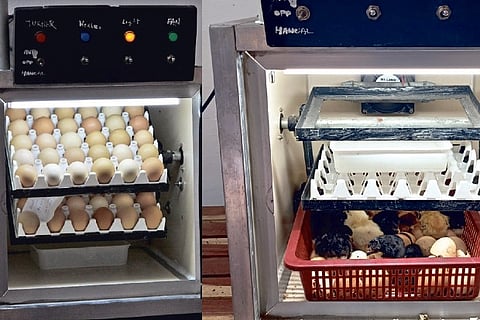

Chennai
Many farmers using electric incubators have stated that hatchability has been affected due to power shortage or frequent suspension of supply. The power cuts cause difference in temperatures and humidity which lead to the death of the embryo. In an effort to tackle this, the TANUVAS – University Innovation and Instrumentation Centre developed a solar-powered model with final-year Electrical and Electricals students from Panimalar Engineering College.
“This system has 70%-80% hatchability rate. If the power goes out, the inverter will immediately kick in to continue keeping the eggs in right condition. We ran the first test run about 21 days back and on Monday morning the first batch of chicks was hatched, which numbered to 21 in total. We expected over 40 chicks to hatch from this batch of 60 eggs, as 15 are infertile,” said Dr S Meenakshi Sundaram, Head of Department, Livestock Farm Complex.
The team of students from Panimalar Engineering College worked with the scientists with the Poultry Research Station, Directorate of Centre for Animal Production Studies, TANUVAS and the guidance of their head of department, Dr S Selvi, for three months.
For the students, the biggest challenge was to recreate the ideal conditions for incubation in their solar-powered model.
“We took care to replicate the natural incubation conditions. The system has two thermometers, one dry and one wet, to keep a constant tab on the humidity and temperature. We have also established a trip-switch in case the conditions become too warm that automatically kicks in,” said Harini V, one of the final year students working on the project, along with her teammates Dharshini A, Abersha D and Judith Percia S.
According to Dr Sundaram, this successful first trial needs further analysis before moving forward with mass production and distribution for rural and small-scale poultry farmers. While the system might be expensive owing to the solar panel systems implemented as part of it, Dr Sundaram feels that with the right kind of governmental support, such a system can greatly help the lives of poultry farmers across the state.
Visit news.dtnext.in to explore our interactive epaper!
Download the DT Next app for more exciting features!
Click here for iOS
Click here for Android